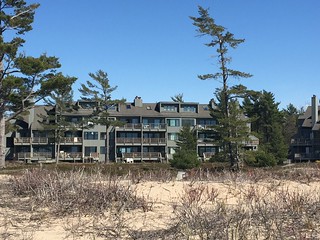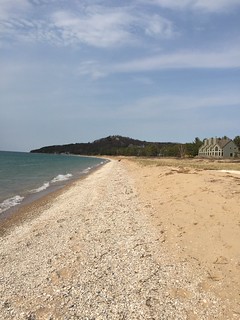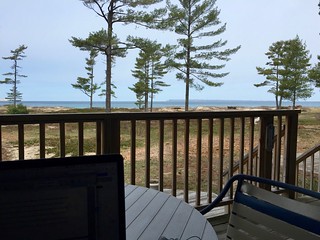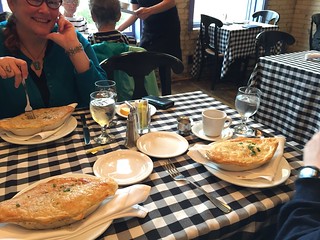I was in Rochester, New York last weekend for the annual Computers and Writing Conference at St. John Fisher College. This was not my first rodeo. I think I have about 20 different presentations at probably about 12 different meetings, maybe more. I have a love/hate relationship with the conference. C&W will always have a place in my heart because it was the first conference where I ever presented– back in 1994– and maybe because of that (and also because I’ve always thought of it as the conference that most closely aligns with my research and teaching interests), I have found the whole thing kind of frustrating in recent years.
A better and more complete (albeit more chaotic) way to get a sense of what happened this year is to go to Twitter and search for #cwcon. I tried to make a Storify of all the tweets, but the limit is 1000, so I only was able to get tweets from Sunday and some of Saturday. If I get around to it, maybe I’ll make another Storify or two– unless there’s a better/easier way to capture all those tweets.
Anyway, a recap from my POV:
- Bill Hart-Davidson and I drove there together. Bill and I have known each other since 1993 (he was on that panel with me at C&W in Columbia, Missouri back in 1994, and he claimed on this trip that Cindy Selfe either chaired our session or was in the audience, I can’t remember which) and we both like to talk a lot, so there and back was pretty much seven straight hours of the Bill and Steve talk show. It’s a good thing no one else was with us.
- We got there Wednesday late in the afternoon and played a quick nine holes with Nick Carbone before meeting up with a bunch of Ride2CW and conference goers at a lovely place called Tap & Mallet.
- Bill and I stayed in the dorms at St. John Fisher. Dorms are a staple of #cwcon, but this is the first time I’ve actually stayed in them mainly because ew, dorms. But given that the hotels for the conference were almost 10 miles away and St. John Fisher is small private college, we both opted for the calculated risk that these dorms would be okay. And that risk paid off, too. The only things missing from the room were a television and, oddly, a garbage can.
- Bill ran a workshop Thursday, so I ended up hanging out with Doug Walls (soon to be faculty at NC State, congrats to him) for a lot of the day and then working on school stuff back in the garbage can-less dorm.
- Had kind of a weird Friday morning because I woke up for no reason at 5 am or so, went back to sleep thinking that I’d wake up at 8-ish and I ended up sleeping until 10 am. So, with the morning of the first day of presentations thoroughly trashed, I went to the George Eastman Museum instead. Pretty cool, actually.
- Friday afternoon, I saw some presentations– a good one from Alex Reid, and an interesting/odd session from some folks at East Carolina called “Object-Oriented Research Methods and Methodologies for Open, Participatory Learning” which was not at all what I was expecting. It ended up mostly being about using fortune tellers/cootie catchers as a sort of heuristic for writing research. Showed up a little late for a panel where Bradley Dilger and crew were talking about the Corpus & Repository of Writing project. Interestingly, there were a number of talks/presentations/workshops on methods for capturing and/or mining a lot of “big data” in writing– well, big for our field at least. What I didn’t see much of was what all this mining and corpus-building gets us. Maybe the results will come eventually.
- Went to the banquet/awards/Grabill keynote. More on the awards thing in a moment, but to kick off the after-eating festivities, there was a tribute video to Cindy and Dickie Selfe who are retiring this year. The set-up for the banquet made watching the video pretty impossible, but it’s on YouTube and it’s definitely worth a watch. Both of them have been such giants in the field, and it really is a lovely send-off/tribute.
- Jeff Grabill gave a good talk– it’s right here, actually. I think he thought that he was being more confrontational than he actual was, but that’s another story. Alex Reid has a good blog post about this and one of the other key things going this year at the conference, which has to do with what I think I would describe as a sort of question of naming and identity.
- Speaking of which: my session was on Saturday morning. My presentation was about correspondence schools and how they foreshadow and/or set the groundwork for MOOCs. It was okay, I guess. It was a sort of mash-up version of a part of the first chapter/section of this book I’ve been working on for far too long (which is also one of the reasons why I’m not going to post it here for now) and I think it’s good stuff, but it wasn’t really that dynamic of a presentation. I ended up being paired up with Will Hochman, and his approach was much more of an interactive brainstorming session on trying to come up with a new name for the conference. I don’t know if we “solved” the problem or not, but it was a fun discussion. Lauren Rae Hall and she created a cool little conference name generator based on stuff we talked about.
- Walls made me skip the lunch keynote to get pizza (twisted my arm, I tell you!) and then I went to the town hall session where Bill was on the panel. Alex Reid blogged a bit about this (and other things) in this post; while I suppose it was interesting, it was another example of a session that is advertised/intended as one where there is going to be a lot of audience discussion and where, after the many people on the panel all said their bits, we were pretty much out of time. And then we drove home.
So it was all good. Well done, St. John Fisher people! Though I can’t end this without beating the drum on three reoccurring themes for me, the hate dislike/grumpy side of me with #cwcon:
First, I think the work at reconsidering the name of the conference is perhaps symptomatic of the state of affairs with the general theme of the conference. “Computers and Writing” is a bit anachronistic since the definition of both “computers” and “writing” have been evolving, but it wouldn’t be the first name of an organization that seems out of date with what it is– the “Big Ten” with its 14 teams immediately comes to mind. So maybe the identity issues about the name of the conference have more to do with the fact that the subject of the conference is no longer a comparatively marginalized sub-discipline within composition and rhetoric.
Take that with a significant grain of salt. I was on a roundtable about the “end” of computers and writing in 2001 and we’re still chugging along. But that video honoring Cindy and Dickie Selfe featured some other senior members in the C&W community remembering the “old days” of the 1980s and even early 90s (really not that long ago, relatively speaking) when anyone in an English department working with a computer was considered a “freak.” Scholarship and teaching about technology and materiality (not to mention “multimodality” which often enough implies computers) might not be at the center of the field, but it’s not on the “lunatic fringes” of it anymore either. That’s good– it means folks like the Selfes were “right”– but it also makes #cwcon a little less “special.” I can go to the CCCCs and see lots of the same kinds of presentations I saw this last weekend, not to mention HASTAC.
Second, I really wish there was a way to hold this conference more regularly some place easy to get to. Rochester wasn’t bad (though still a regional airport), but in recent years, #cwcon has been in Menomonie, Wisconsin; Pullman, Washington; and Frostburg, Maryland. And next year, it’s going to be Findlay, Ohio, which is good for me because that’s only 90 miles away but not exactly easy for anyone planning on not driving there.
And third, there’s still the lack of basic infrastructure. As Bill and I discussed in our 14+ hours of car time, HASTAC specifically and Digital Humanities generally have their own organizational problems, but at least there are web sites and organizations out there. We’re a committee buried in a large subset (CCCCs) of an even larger organization (NCTE), and as far as a web site goes, um, no, not so much. During the many awards, I tweeted that it sure would be nice if there was a page of winners of various things posted somewhere. Someone who will remain nameless said it was all they could do to not tweet back something snarky about “where.”
If I get the time or energy to track that info down, I’ll post it here or somewhere else….










